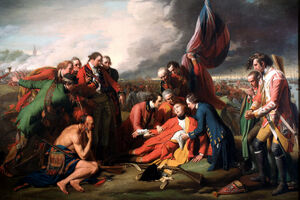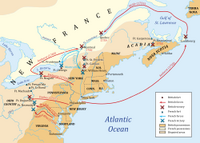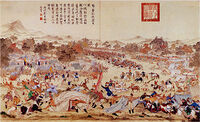| First Global War | |||||||
|---|---|---|---|---|---|---|---|

| |||||||
| |||||||
| Belligerents | |||||||
File:Prussia with No Christianity.png Prussia
|
|||||||
The First Global War was a global conflict lasting from 1754/56 to 1761/63. It is British America's counterpart to the OTL Seven Years' War.
Conflicts between the United Kingdom and France started in 1754 after attacks on various French properties in America. During this time, Prussia and Austria were struggling for dominance in central Europe. In East Asia, the Kingdom of Bengal had recently suffered a French takeover of Chandannagar and the land around it. China launched an invasion of the Zunghar Empire in hopes of conquering it.
In 1756, the countries formed alliances; Prussia, Britain, Bengal, and the Zunghar Empire sided together, while each of their opponents made an alliance with the Treaty of Versailles. Britain and allies were joined by various smaller German states and Portugal after a Spanish invasion. The French alliance eventually grew to include Sweden, Saxony, and various other states.
The war ended with the Treaty of Paris and Treaty of Hubertusburg. The war was a great success for Britain and the Zunghar Empire in specific; the war saved the Zunghar Empire from not completely dying, and Britain gained numerous new territories in North America.
Theatres of conflict[]
North American theatre[]
Main article: French and Indian War
The North American theatre was predominantly fought between New France and British America, along with various Amerindian tribes. The British had a huge advantage from the very beginning, as their colonies had a much larger population; 60,000 to 2 million. Because of this, the French relied on the less advanced aboriginal tribes they had allied with. The two nations declared war in 1756.

Europeans and Amerindians engaging in trade
The North American theatre was primarily fought along the frontiers of New France and British America, from as south as Virginia to as north as Nova Scotia. The conflict began with a territorial dispute over the Allegheny and Monongahela rivers, which eventually erupted into violence. In 1754, Virginia militiamen attacked a French patrol under George Washington.

France's hold in North America during the mid-18th century.
In 1755, colonial governors in British America met and planned a four-way attack on France. This failed, and the main effort was a disaster; the British were defeated in the Battle of the Monongahela. In the following years, the frontier areas of Pennsylvania and New York failed due to poor management and internal divisions.
Despite this, in 1755, the British captured Fort Beausejour on the border of Nova Scotia and Acadia. The 1757 British campaigns were disastrous. Many of them ended with Indian torture and massacres of British victim. However, hope came for the British later in the war as William Pitt came and increased British military spending in the colony. However, the French failed to give New France military support as they concentrated their forces against Prussia and her allies.
The British launched a campaign to capture Canada in 1758. They succeeded, capturing Canada and all surrounding colonies. The British were later defeated at Sainte Foy in Quebec, however the British still won the war. The war helped develop centuries of Anglo-French conflict.
East Asian theatre[]
Main article: Sino-Zunghar War
The Chinese Wing Dynasty invaded the Dzunghar Khanate during the mid-1700s as a part of the Ten Great Campaigns. The timing of this specific campaign was disastrous, though, as the Seven Years' War broke out across Europe and into parts of Asia as far east as the Kingdom of Bengal.

The battle of Orio-Jalatu, a battle of the Sino-Zunghar War.
In hopes of gaining more land for their empire, the French launched an invasion of the dying Zunghar Khanate. Due to the hatred between the two, the British sided with the khanate against the Chinese and the French.
In the battle of Orio-Jalatu in 1758, Chinese leader Zhao Hui ambushed Amursana and his Zunghar army. The Chinese had the advantage for most of the battle, having a smaller but more powerful army. At that point, much of the fragile Zunghar army had been defeated. Later that night, British troops marched in and sparred with the Imperial Qing army, resulting in a Zunghar victory.
From 1758 to 1762, various minor battles occurred with mostly mixed results. When the war ended, the British victory was official, leading to the Chinese and French surrender. This battle was seen as a failure to the Qing dynasty, and held off the Chinese invasions of other khanates in eastern Asia. Not too long after the end of this conflict, though, the Sino-Burmese War would start.
Pomeranian theatre[]

A map of Pomerania
In early 1757, the Pomeranian War started. The clashes im Pomerania were predominantly between Sweden and Prussia. It was characterized by the movements of both armies; none scored a decisive victory; despite Prussia's side winning in the bigger conflict. The Pomeranian theatre started after Sweden advanced into Prussian territory in 1757. The Prussians repelled and blockaded the Swedish troops, until Russian forces came and helped the Swedes. The Russians helped the Swedish forces invade the Prussian territory. Prussia's small fleet was destroyed in the Battle of Frisches Haff.
1759 was an overall bad year for the Swedes. The undersupplied Swedish forces had several major unsuccessful battles. They failed to take the Prussian fortress of Stettin nor combining with the Russians. In 1760, a Prussian attack on Pomerania was repelled; and the Swedes advanced as far south as Prenzlau. In the winter, the Swedes retreated back to their original Pomeranian territory. The Prussians realized this, and made various small gains in Pomerania.
Another Swedish campaign started in 1761, although it was eventually aborted due to a lack of supplies. The war's final battles took place in 1762 near Malchin and Neukalen in Mecklenburg. Later, Prussia, Russia, and Sweden agreed to the Truce of Ribnitz on April 7th. On May 5, the Prussian-Russian alliance eliminated Sweden's hopes for Russian assistance. Sweden was forced to make peace. The war in Pomerania formally ended on May 22, 1762 by the Peace of Hamburg.
Indian theatre[]
The breakout of the Seven Years' War resulted in conflicts between British and French forces on the Indian subcontinent. The war also spread into Bengal, where British forces captured Chandernagore in 1757. The Mughal Empire sided with the British in the war, and the Kingdom of Bengal. In 1758, Qing forces marched into India on the French's side, and helped the French regain half of Chandernagore. In the south, British commander Sir Eyre Coote defeated the French in the Battle of Wandiwash. Pondicherry fell tot he British in 1761. The war concluded in 1763 after the signing of the Treaty of Paris. The British became a dominant force in India, crushing France's dreams of creating an Indian Empire. The Kingdom of Bengal grew to power as well after the war. Eventually the United Kingdom would go on to declare war on Bengal, which eventually lead to the British conquest of India, after Mir Jafar's betrayal.
